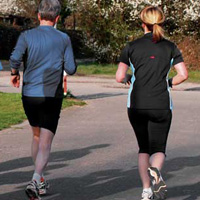From the Spring 2012 issue of .
Is aging gracefully тАУ and healthily тАУ a matter of good genes and better luck? Or can we boost our chances of enjoying an energetic old age?
║┌┴╧│╘╣╧═Ї researchers across disciplines are probing this question, and results suggest strategies we can adopt, whatever our age, to improve our elder years.
From a project that uses smart phones to improve mobility, to a 20-year study that will shed new light on the process of aging, ║┌┴╧│╘╣╧═Їstaff and students are toiling today to help tomorrowтАЩs seniors live longer, healthier тАУ and smarter.
тАЬWeтАЩre really interested in understanding the process of aging, not just studying the aged,тАЭ says Susan Kirkland, a professor in the Departments of Medicine and Community Health and Epidemiology and DalhousieтАЩs lead researcher on the Canadian Longitudinal Study on Aging. Supported by the Canadian Institutes of Health Research, this massive undertaking will follow 50,000 people aged 45 to 85 for 20 years.
тАЬThe trajectory from mid-life onward is crucial to how you age. This really allows us to look at critical periods, critical events, and how these things inter-relate over a lifetime,тАЭ says Dr. Kirkland. тАЬYou canтАЩt really look at the social aspects in isolation from the physical aspects and the economic aspects and the physiological aspects.тАЭ
She expects the studyтАЩs findings will influence policies across the country, and be accessed and used by a multitude of researchers from many sectors, long after itтАЩs finished. But those of us concerned about aging better today neednтАЩt wait: Dal researchers have insights that can help us age smarter тАУ starting now.
Get smart
The research: Pssst тАж wanna improve brain function as you age? The solution, pure and simple, is exercise, says geriatrician and professor Kenneth Rockwood. тАЬIf you could put it in a pill, youтАЩd make a hundred million bajillion dollars,тАЭ he says. тАЬExercise has been scientifically demonstrated to increase the part of the brain that shrinks, thatтАЩs associated with dementia, the hippocampus.тАЭ
 HeтАЩs seen the results firsthand: his тАЬstar patientsтАЭ тАУ those whose condition hasnтАЩt worsened in 10 years тАУ all are physically active. Exercise also appears to prevent dementia, a fact he emphasizes to the middle-aged children of his patients. тАЬWhat IтАЩm aiming to do is have people die healthier,тАЭ he says.
HeтАЩs seen the results firsthand: his тАЬstar patientsтАЭ тАУ those whose condition hasnтАЩt worsened in 10 years тАУ all are physically active. Exercise also appears to prevent dementia, a fact he emphasizes to the middle-aged children of his patients. тАЬWhat IтАЩm aiming to do is have people die healthier,тАЭ he says.
How you can age smarter: Up your exercise quotient, with Dr. RockwoodтАЩs advice. Get an exercise program custom designed by someone in the know. Include exercises you can do regardless of weather. Exercise with an enthusiastic coach тАУ a spouse or friend. Aim for 45 minutes of brisk activity five or six days a week. Include or add 30 minutes of simple resistance training three days a week.
тАЬAfter six weeks or so you will resent it less. By four or five months you may become that obnoxious person who says тАШI canтАЩt talk to you right now тАУ I have to go for my run,тАЩтАЭ he says.
Game on
The research: The stereotypical image of a тАЬgamerтАЭ might be a slack-jawed teen, but what if older people used iPhones and Wiis to improve their joint health?
 тАЬYou could have a senior who needs to keep walking, and we could equip them with a smart phone that would send them a text to remind them to go for a walk and would monitor how much they walked and how theyтАЩre walking,тАЭ says Michael Dunbar, professor of surgery in the Division of Orthopedics. тАЬWhen theyтАЩre done walking, they would turn off the app and get some feedback about how theyтАЩre doing. They wouldnтАЩt have to go into a hospital.тАЭ
тАЬYou could have a senior who needs to keep walking, and we could equip them with a smart phone that would send them a text to remind them to go for a walk and would monitor how much they walked and how theyтАЩre walking,тАЭ says Michael Dunbar, professor of surgery in the Division of Orthopedics. тАЬWhen theyтАЩre done walking, they would turn off the app and get some feedback about how theyтАЩre doing. They wouldnтАЩt have to go into a hospital.тАЭ
Dr. Dunbar and his 15-person research team want to improve gait health by helping older adults avoid needing joint replacement surgery in the first place, and by customizing artificial joints once theyтАЩre required. And smart phones and Xboxes will likely play a role. For instance, a patient could exercise in front of a TV gaming system, with the results fed back to hospital staff and researchers for analysis. Or someone with a problem-causing gait could receive biofeedback via headphones while on a treadmill.
If joint replacement is needed, such devices can be used to determine the best location and placement for them, rather than the current system of implanting each one the same way.
How you can age smarter: While research is still in the early stages, Dr. Dunbar suggests the principles can improve joint health at any age. Find apps that can help by searching online app stores using the keywords fitness, exercise reminder or exercise tracker. Find fitness programs for gaming systems by searching keyword fitness on the Playstation and Xbox websites.
Jump up
The research: It sounds like an oxymoron тАУ active couch potato. But itтАЩs a modern-day phenomenon.
 тАЬPeople go to the gym and then say тАШOK, I did my exercise for today and now I can go home and sit in front of the TV all day and eat chips,тАЩтАЭ explains Olga Theou, a postdoctoral fellow in geriatric medicine research. тАЬBut it turns out itтАЩs not just exercise thatтАЩs important тАУ itтАЩs also about how much time you spend sitting down.тАЭ Indeed, exercisers who spend seven hours a day sitting down have a 50 per cent increased risk of death compared to those who only sit for one hour a day. ┬а
тАЬPeople go to the gym and then say тАШOK, I did my exercise for today and now I can go home and sit in front of the TV all day and eat chips,тАЩтАЭ explains Olga Theou, a postdoctoral fellow in geriatric medicine research. тАЬBut it turns out itтАЩs not just exercise thatтАЩs important тАУ itтАЩs also about how much time you spend sitting down.тАЭ Indeed, exercisers who spend seven hours a day sitting down have a 50 per cent increased risk of death compared to those who only sit for one hour a day. ┬а
These sorts of insights are inspiring Dr. TheouтАЩs upcoming research into the mobility of hospital patients in Nova Scotia. SheтАЩll use accelerometers тАУ devices that measure acceleration forces and sit on the hip much like a pager тАУ to determine when, how and how long theyтАЩre lying down, sitting, standing and moving. тАЬWe want to see how mobility impacts on their recovery,тАЭ she says.
How you can age smarter: Staying in constant motion isnтАЩt usually an option. But standing desks are becoming more popular, even for computer users, and simply ensuring that we stand and move as much as possible fosters incremental benefits. Why not set a computer timer to go off every 30 or 60 minutes, and then spend five minutes doing tasks while standing? Or use phone time as an excuse to get vertical. It all adds up.
Mix 'n' Match
The research: Injury and brain disease can have a significant impact on how we process information. But it isnтАЩt always easy to figure out exactly how those processes have been affected, and what we can do to help repair them.
тАЬWe donтАЩt really have good interventions right now for cognitive problems,тАЭ admits Gail Eskes, associate professor of psychiatry at Dal. Enter the cognitive repair kit being developed by Dr. Eskes with Bedford software company TeamSpace. With funding from the federal governmentтАЩs Atlantic Canada Opportunities Agency (ACOA), theyтАЩre creating software to both assess and prescribe treatment for stroke patients of all ages, focusing on тАЬworking memory,тАЭ including paying attention, doing two tasks at once and staying on track. While this version of the kit is targeted at stroke patients, later versions may be developed for other patient groups.
In another line of research, Dr. Eskes is studying normal aging and how physical activity and cognitive engagement through a variety of leisure activities affect cognitive performance. In this research, sheтАЩs found that diverse activities тАУ crossword puzzles, photography, reading, computer games, volunteering тАУ can help older people maintain their cognitive performance.
How you can age smarter: This research suggests diverse leisure activities are key to maintaining memory and overall cognitive ability. Dr. Eskes says this suggests that learning a new skill or varying your routine can be beneficial. And, since exercise seems to magnify the effect, regular physical activity is also key.
Build connections
The research: Social vulnerability isnтАЩt just about not getting invited to the cool kidsтАЩ parties. For older people, it can mean life or death.
тАЬEven when we look at the healthiest older people, their social vulnerability makes a really big difference to their mortality,тАЭ says Dal geriatrician Melissa Andrew. Her new study shows highly vulnerable people тАУ based on factors such as socio-economic status, community engagement, availability of caregivers тАУ have more than twice the mortality of those with the lowest vulnerability. The study found a mortality rate of 30 per cent versus 10 per cent, says Dr. Andrew, who recently published the findings in the journal Age and Ageing and hopes to replicate the study in another country, as well as in a local hospital. ┬а
Social environments should be part of a holistic approach by health-care providers, Dr. Andrew argues. тАЬSomeone might live alone but have lots of support and engage in lots of activities to make up for that. By artificially simplifying things, we miss the bigger picture,тАЭ she says. тАЬWe need to determine how we can think in a more structured way about peopleтАЩs social environment, which will also allow us to come up with targeted interventions.тАЭ
How you can age smarter: Dr. AndrewтАЩs research to date indicates those with better connections to a support network are healthier in old age тАУ and those connections donтАЩt develop overnight. Forging connections through community activities and fostering relationships across generations can keep us healthier as we age.

